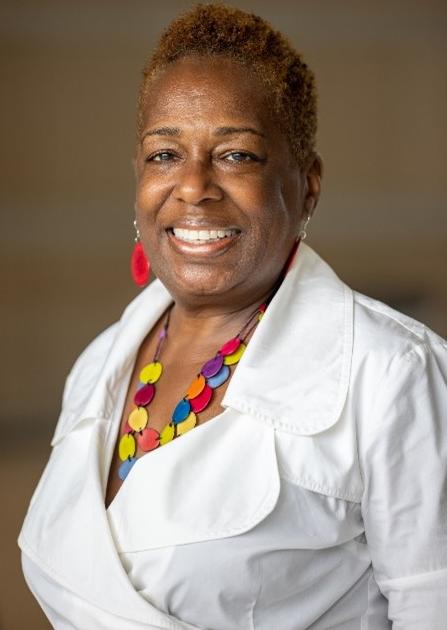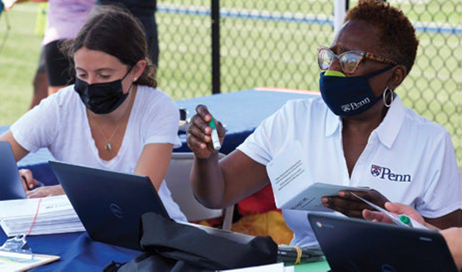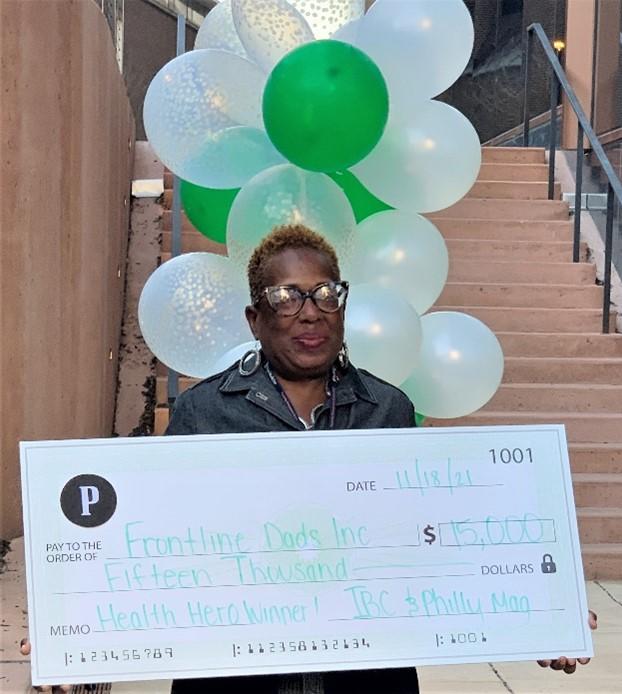Black History Month Spotlight: NON Community Health Educator Armenta Washington Makes a Difference in the Time of Greatest Need
, by CRCHD Staff
In recognition of Black History Month, we at the NCI Center to Reduce Cancer Health Disparities (CRCHD) are recognizing CRCHD scholars on the Center's blog, Dialogue on Disparities. In these spotlights, scholars discuss what Black History Month means to them, recognize their role models, and describe their research and career. This spotlight features National Outreach Network Community Health Educator Armenta L. Washington, MS, who in March 2020 became Research Coordinator Senior, Penn Medicine - Abramson Cancer Center, Perelman School of Medicine.
Washington on Her Unexpected Connection to an Historical Icon, Her Black History "Shero," and Being of Service Every Day
What does Black History Month mean to you?
Harriet Tubman once said, “Every great dream begins with a dreamer. Always remember, you have within you the strength, the patience, and the passion to reach for the stars to change the world.” As a young Community Health Educator (CHE), I delivered a workshop at Chester High School in Chester, PA. At the time Chester High was in one of the lowest performing school districts in the Commonwealth of Pennsylvania. Upon introducing myself to the students they told me, “You have the same name as Harriet Tubman.” I left and did my research to find that they taught me something I had never known — the woman we all know as Harriet Tubman was born Araminta Ross. She changed her name while trying to escape slavery and so it would be difficult to track. She adopted the name Harriet in honor of her mother and took her husband’s last name, Tubman.
Tubman was not only a fearless conductor on the “Underground Railroad,” but she too was a public health servant. She served as a field nurse during the Civil War and in her later years established the “Home for Aged and Indigent Negros.” My role as an African American CHE can be a heavy lift. I must counter misinformation couched in a healthy distrust of a medical system that has not always been fair to my community. I, Armenta, stand on the shoulders of Araminta Harriet Ross Tubman, a public health foot soldier who paved the way for me. My responsibility is to help my people to a different freedom, one of optimal health. I continue to reach for the stars to change the world.
My role as an African American CHE can be a heavy lift. I must counter misinformation couched in a healthy distrust of a medical system that has not always been fair to my community. —Armenta Washington
Are there role models — past and present — who have been an inspiration to you and your work and whom you would like to recognize this Black History Month?
My maternal grandmother, Ninivar Brown is to me the definition of black history. She celebrated her 98th birthday during Black History Month, which is historical to our family. Born in the Jim Crow Era with a vivid recollection of her upbringing and experiences, my grandmother shares memories about her parents and extended family who raised her when both her parents died at a very early age. My grandmother has been my inspiration and role model for living a healthy lifestyle. She has been very intentional about her eating habits, is in excellent health for her age, and is very witty. My grandmother is my Black History “Shero.”
I, Armenta, stand on the shoulders of Araminta Harriet Ross Tubman, a public health foot soldier who paved the way for me. My responsibility is to help my people to a different freedom, one of optimal health. I continue to reach for the stars to change the world. —Armenta Washington
What inspired your interest in becoming a Community Health Educator?
Being a servant of the people is in my DNA — I witnessed both of my parents being servants in the community. At the point I realized most of what was impacting my community was interrelated, I knew that I needed to make public health my career. The fact that I was born in a particular place could dictate my educational attainment, access to a healthy home, a safe environment, and access to quality healthcare was a devastating realization. My lived experience allows me to approach my work with awareness of the vast divide that exists for my black and brown people. I often tell people I am a Social Worker trapped in the body of a CHE. I cannot simply apply a bandage to a hemorrhage — it requires a different type of care. It is a privilege to be of service every day.
How have you and your career been impacted by becoming a National Outreach Network (NON) CHE and being part of this community?
Penn Medicine’s Abramson Cancer Center (ACC) is one of the leading centers in the country. It is an absolute honor to work under the direction of Robert H Vonderheide, MD and Carmen E. Guerra, MD at this time in medicine. Their guidance has been critical in my ability to emerge as a leader within ACC. I am continually provided opportunities to utilize my gifts, talents, and creativity to be a difference maker. Being appointed to be the NON CHE in the midst of a global pandemic has been transformational. Being a trusted member of a team to invent real-time solutions that will benefit the community has been the highlight of career. The ability to have the greatest impact when the community needs it the most is hard to put into words. I am privileged to be surrounded by a group of colleagues at ACC who have supported me during these unprecedented times. The collective support of so many has made my success as a NON CHE possible.
The ability to have the greatest impact when the community needs it the most is hard to put into words. —Armenta Washington
I have been a NON CHE since its inception, with the opportunity to learn from others in the field across the country to develop innovative approaches to engage underserved communities. I have formed longstanding relationships with my colleagues Terrence Adams of MD Anderson, Khaliah Fleming of Moffitt Cancer Center, as well as Mayra Serrano and Marisela Garcia with City of Hope. Throughout the years they have provided guidance, direction, and moral support. The leadership at the Center to Reduce Cancer Health Disparities (CRCHD) has been very supportive as I transitioned into my new role at Penn Medicine’s Abramson Cancer Center during this unprecedented time.
In the last year or so, you and the ACC team have been busy! You and the team have been recognized for your Drive by Flu-FIT program and graduated the first class of ACC Clinical Trial Ambassadors, including a talk from the Lacks family. Can you describe these important efforts?
Drive By Flu-FIT
Want to talk about a new normal? I arrived at ACC on March 16, 2020, as the entire City of Philadelphia and many parts of the world went into lockdown. As I onboarded from home, I would look out the window and wonder if I had made the right decision. The entire University of Pennsylvania Health System was struggling to figure out how we could best serve our community during the global pandemic. Social unrest was happening all around the world and in my community. The U.S. National Guard had a command center located a few blocks from my home.
The world of public health got even more complicated when, in August 2020, Chadwick Boseman died. What did this mean for the African American community if “Black Panther” could die from colon cancer? Reverend Leroy Miles of Enon Tabernacle Baptist Church contacted Penn Medicine. He wondered what we could do to address the disparity of colorectal cancer (CRC) in the African American community. We put our heads together to leverage what Enon was doing to engage well over 14,000 people at the height of the pandemic. We joined the National Cancer Institute’s Screen to Save initiative with the American Cancer Society’s Flu-FIT and “Drive by Flu-FIT” was born. Fast forward, we have engaged well over 250 participants and have experienced an 80.5% return rate on the fecal immunochemical test (FIT) tests.
We joined the National Cancer Institute’s Screen to Save initiative with the American Cancer Society’s Flu-FIT and “Drive by Flu-FIT” was born. —Armenta Washington
I was invited to deliver an oral presentation to the American Association for Cancer Research (AACR) COVID and Cancer meeting. There I presented findings of the socially distanced Drive by Flu-FIT program for CRC screening. ACC was able to demonstrate that the program was feasible, acceptable, and effective in engaging the African American community in CRC education and screening, despite the challenges imposed by the COVID-19 pandemic.
As a result of the international recognition at AACR I was invited to a meeting of the President's Cancer Panel on February 11, 2021, where we discussed the novel model for increasing CRC screening during the COVID-19 pandemic in Black communities of Philadelphia.
Clinical Trial Ambassadors
Previously during my time at Fox Chase Cancer Center (FCCC), Evelyn Gonzalez and I developed three cohorts of a Clinical Trial Ambassador program. As the program developed at FCCC was proprietary, ACC wanted to develop its own version. The eight-module training focused on how to engage primarily with African American patients and communities in conversations about cancer. The training provided participants with information on the importance of cancer research participation to include biospecimen research. In October 2022, ACC graduated 19 ambassadors from the inaugural pilot. The greatest honor was to have the grandchildren of Mrs. Henrietta Lacks as the keynote speakers for the graduation.
This award lets me know my efforts as a public health servant have not gone unnoticed. It is said that “What you put out will come back to you.” When I sit back and think about my efforts, this affirms that I have not just made a difference, but I am a difference maker. —Armenta Washington
In December you were recognized as Philadelphia Magazine’s 2021 Health Hero. Congratulations! What did receiving this distinction mean to you?
I am truly humbled and grateful for the recognition. Being named the 2021 Philly Health Hero in the height of a global pandemic is one the biggest honors the City of Philadelphia could give me. This award lets me know my efforts as a public health servant have not gone unnoticed. It is said that “What you put out will come back to you.” When I sit back and think about my efforts, this affirms that I have not just made a difference, but I am a difference maker.


